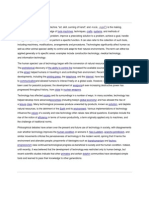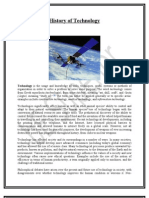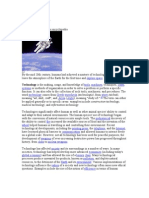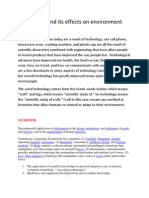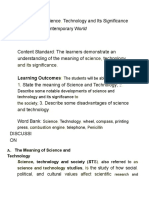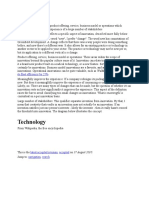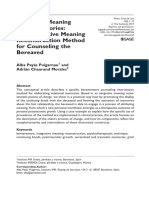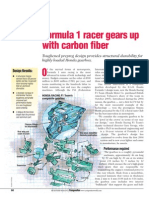UNIT 19.
TECHNOLOGY
Text 1. Read and translate the text into Ukrainian.
Technology
Technology is the making, usage, and knowledge of tools, machines, techniques, crafts, systems or
methods of organization in order to solve a problem or perform a specific function. It can also refer to the
collection of such tools, machinery, and procedures. The term can either be applied generally or to specific
areas: examples include construction technology, medical technology, and information technology.
Technologies significantly affect human as well as other animal species’ ability to control and adapt to
their natural environments. The human species’ use of technology began with the conversion of natural
resources into simple tools. The prehistorical discovery of the ability to control fire increased the available
sources of food and the invention of the wheel helped humans in travelling in and controlling their
environment. Recent technological developments, including the printing press, the telephone, and the
Internet, have lessened physical barriers to communication and allowed humans to interact freely on a global
scale. However, not all technology has been used for peaceful purposes; the development of weapons of ever-
increasing destructive power has progressed throughout history, from clubs to nuclear weapons.
Technology has affected society and its surroundings in a number of ways. In many societies, technology
has helped develop more advanced economies (including today's global economy. and has allowed the rise of
a leisure class. Many technological processes produce unwanted by-products, known as pollution, and deplete
natural resources, to the detriment of the Earth and its environment. Various implementations of technology
influence the values of a society and new technology often raises new ethical questions. Examples include the
rise of the notion of efficiency in terms of human productivity, a term originally applied only to machines,
and the challenge of traditional norms.
Philosophical debates have arisen over the present and future use of technology in society, with
disagreements over whether technology improves the human condition or worsens it. Neo-Luddism, anarcho-
primitivism, and similar movements criticise the pervasiveness of technology in the modern world, opining
that it harms the environment and alienates people; proponents of ideologies such as transhumanism and
techno-progressivism view continued technological progress as beneficial to society and the human
condition. Indeed, until recently, it was believed that the development of technology was restricted only to
human beings, but recent scientific studies indicate that other primates and certain dolphin communities have
developed simple tools and learned to pass their knowledge to other generations.
The use of the term technology has changed significantly over the last 200 years. Before the 20th century,
the term was uncommon in English, and usually referred to the description or study of the useful arts. The
term was often connected to technical education, as in the Massachusetts Institute of Technology (chartered
in 1861.. "Technology" rose to prominence in the 20th century in connection with the second industrial
revolution. By the 1930s, "technology" referred not to the study of the industrial arts, but to the industrial arts
themselves.
Technology can be most broadly defined as the entities, both material and immaterial, created by the
application of mental and physical effort in order to achieve some value. In this usage, technology refers to
tools and machines that may be used to solve real-world problems. It is a far-reaching term that may include
simple tools, such as a crowbar or wooden spoon, or more complex machines, such as a space station or
particle accelerator. Tools and machines need not be material; virtual technology, such as computer software
and business methods, fall under this definition of technology.
Technology can be viewed as an activity that forms or changes culture. Additionally, technology is the
application of math, science, and the arts for the benefit of life as it is known. A modern example is the rise of
communication technology, which has lessened barriers to human interaction and, as a result, has helped
spawn new subcultures; the rise of cyberculture has, at its basis, the development of the Internet and the
computer. Not all technology enhances culture in a creative way; technology can also help facilitate political
oppression and war via tools such as guns. As a cultural activity, technology predates both science and
engineering, each of which formalize some aspects of technological endeavor.
